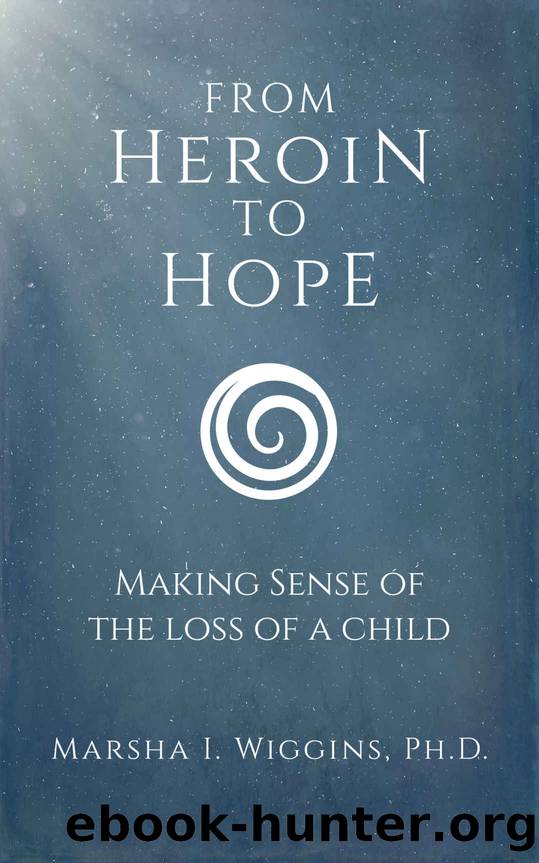From Heroin to Hope by Wiggins Marsha

Author:Wiggins, Marsha
Language: eng
Format: epub
Tags: Reference
Publisher: KoruSpirit, LLC
Published: 2018-09-05T16:00:00+00:00
Other Signs of Prolonged and Difficult Grief
Alan Wolfelt wrote about other behavioral signs that may indicate one is “stuck” in the acute stage of grief and not able to wring oneself from its grasp. He indicated that postponement, displacement, or replacement were such signals. It is perfectly normal to find the death of one's child literally “unbelievable” or “incredible” when we first learn about it. In fact, not being able to believe our child is gone is extremely common. Even as the months and years pass, we all have moments when we want to pinch ourselves because we simply can't fathom our loss. We want someone to wake us up from this terrible, unrelenting nightmare. And, then, just as quickly, we remember we are living with this loss and it is, indeed, a fact. There are, however, those who have extreme difficulty coming to terms with the death of their child. They steel themselves against the pain. They cut themselves off from their feelings. They force back the tears. They refuse to think about it, hoping it will go away. This type of long-term denial interferes with a healthy grief process and keeps a parent from gaining the traction needed to rebuild a life.
Sometimes the pain of our loss is so intense we do not believe we can bear it, and thus, we attempt to rid ourselves of it by directing it toward other things. We lash out at family members, friends, and co-workers. We blame God. We feel angry, cynical, and hateful toward anything that potentially could bring comfort, solace, or pleasure. Essentially, this displacement of grief is the attempt to get rid of it with the hope of relieving ourselves of the pain it produces. Unfortunately, displacement only results in paralysis and disruption of the very aspects of life that could bring us some measure of healing.
Replacement of our grief is another sign we have gotten off course in our grief journey. Replacing our grief involves investing the emotions we felt in our relationship with our deceased child into someone or something else. If we are single, we may rush into a new romantic relationship, or if partnered, we may become vulnerable to an extramarital affair. We may consider having or adopting another child. Replacing our grief may mean we pour all our energy into our work or become obsessed with a particular hobby when we did not behave with that kind of intensity prior to our child's death. Although focusing on work or hobbies can bring meaning to our lives, in this instance, replacing grief means getting lost in activities in order to avoid coming to terms with the loss. Attempting to bypass the painful process of grief will likely create difficulties in the future as the unresolved grief eventually begins to corrode our relationships and our new passionate interests.4
Download
This site does not store any files on its server. We only index and link to content provided by other sites. Please contact the content providers to delete copyright contents if any and email us, we'll remove relevant links or contents immediately.
| Adult Children of Alcoholics | Alcoholism |
| Drug Dependency | Gambling |
| Hoarding | Obsessive Compulsive Disorder (OCD) |
| Sexual | Smoking |
| Substance Abuse | Twelve-Step Programs |
The Hacking of the American Mind by Robert H. Lustig(3580)
Right Here, Right Now by Georgia Beers(3497)
Fingerprints of the Gods by Graham Hancock(3212)
Goodbye Paradise(2962)
Bad Pharma by Ben Goldacre(2729)
Happiness by Matthieu Ricard(2524)
More Language of Letting Go: 366 New Daily Meditations by Melody Beattie(2444)
The Social Psychology of Inequality by Unknown(2310)
Drugs Unlimited by Mike Power(2192)
The Plant Paradox by Dr. Steven R. Gundry M.D(2038)
Confessions of a Shopaholic by Sophie Kinsella(1865)
Borders by unknow(1785)
Make Love Not Porn by Cindy Gallop(1751)
Dry by Augusten Burroughs(1687)
Stop Being Mean to Yourself: A Story About Finding the True Meaning of Self-Love by Melody Beattie(1656)
Getting Off by Erica Garza(1619)
Yoga and the Twelve-Step Path by Kyczy Hawk(1533)
Weed, Inc. by Ben Cort(1512)
Unmasking Male Depression by Archibald D. Hart(1507)
